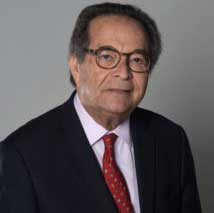Synchronicity in politics

By: Luis Beltrán Guerra G. - 02/11/2025
Share:
According to the Royal Spanish Academy, "synchronicity" is "the coincidence of events or phenomena in time." The DRAE (Dictionary of the Royal Spanish Academy) lists "synchronicity, synchronization, simultaneity, coincidence, coexistence, concordance, coordination, and contemporaneity" as its synonyms, and "diachrony" and "asynchrony" as its antonyms.
Let us also bear in mind that for AI, which we frequently turn to—whether out of laziness, fear of philosophers, particularly the classics, or rather due to the methodology's perceived dominance over humans—"synchronicity" is the meaningful, non-causal coincidence of two or more events. And in a more scientific context, psychiatry, as we have stated in previous essays, is credited with defining it as "the connection of seemingly unrelated events that have special meaning for the person experiencing them." This is distinct from "chance," since the former implies a pattern with meaning or purpose, while "randomness" is random and without inherent significance.
“Politics,” the other word in the title, the complete opposite of “synchronicity,” has not been difficult to define, but it cannot be denied that both words face serious difficulties, both in their interpretation and in the practical application of what they define. This is especially true in the case of politics.
We read that “politics” is meant to describe, on the one hand, “the form of an ideal state” and, on the other, to determine “the form of the best possible state,” logically, within the context of certain circumstances. It is also argued that, despite having numerous definitions, it remains “one of the most ambiguous concepts, compounded by terminological confusions.” Turning to linguistics, it doesn't take much effort to confirm that it has been one of the most explained words, but also one of the most frequently used, often without a clear understanding of its meaning or implications. The opposite is more likely what happens, particularly if we ask ourselves what purpose it serves, because a large majority resort to it thinking only of their own benefit: 1. To act arbitrarily, 2. To embezzle public funds, 3. To persecute those who disagree with their behavior, 4. To carry out illegal activities, knowing that nothing will happen to them, and 5. To seize control of public institutions, transgressing constitutions and laws. AI helps us in this way: 1. “Political arbitrariness consists of acts or decisions taken without a legal or rational basis, based solely on the will or whim of the authority. 2. These actions are often associated with despotic or authoritarian regimes and are contrary to the principle of legality. 3. Some of the most common political arbitrarinesses are: a) political corruption, b) disconnection from reality, c) arbitrary arrests, d) use of ambiguous laws, and e) the application of laws with unclear and discretionary criminal offenses to justify repressive actions. Consequently, it would have to be said that if politics were measured by what it has truly been, is, and will likely continue to be, we would laudatorily conclude that we should read the book by the psychiatrist Cesar Landaeta, who recounts that “King Charles I of England, when he was about to be executed, was told that he could be granted one last wish, to which he replied that He was allowed to wear two shirts, arguing that he wished to avoid his enemies seeing him trembling. Landaeta states that upon hearing this anecdote from his high school teacher, he understood that Charles I was delivering “a moral slap in the face to his rivals.” But he also recounts that his classmate was heard to “tell them to go to hell.” Regarding politics, the king’s message would apply to those ironically called “professional politicians.”
On the contrary, in what “should have been,” the task would be to read Aristotle, for whom “it is evident that there is a science to which it corresponds to investigate what is the best constitution, which more than another is suitable to satisfy our ideals and which adapts to the different conditions to be put into practice,” an unavoidable assumption for good government.
In recent decades, one of the most significant affronts to the philosopher's wise definitions has been the accusation regarding the association of rulers and politicians with "drug trafficking," considered "an illegal activity and a national security concern for many states." However, it becomes more complex and difficult to combat as it adapts and expands beyond national borders. It typically operates within a global framework with intertwined dynamics. Latin America, which is almost universally implicated in this terrible activity, has come under constant surveillance by the United States military, whose government justifies this by citing the harm caused to its population by the trafficking of enormous quantities of narcotics into its territory. It is further alleged that even the public treasury is being targeted with drug money. Are politicians and businesspeople exempt from this terrible scheme? It is certainly a valid question.
To conclude this complex essay, let us simply reiterate that “synchronicity is the meaningful coincidence of two or more events that are not causally connected.” Meanwhile, “synchronization” is the act of making two or more processes or phenomena occur simultaneously and in an orderly fashion in time.
Which, therefore, would be more beneficial: to situate politics within the framework of “synchronicity” or “synchronization”—a complex issue. We believe it could be argued that it lies in one or the other, or even both, to the extent that we strive to:
1. The description of an ideal state, and
2. The determination of the form of the best possible State in relation to certain circumstances.
«The opinions published herein are the sole responsibility of its author».